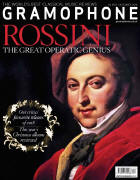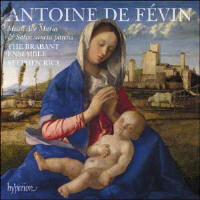Texte paru dans: / Appeared in: |
|
|
Outil de traduction (Très approximatif) |
|
|
Reviewer:
Edward Breen Antoine de Févin (c1470-1511/12) is not currently well known, despite his works having travelled widely in his own day and now being preserved for us in several important sources alongside the work of more famous contemporaries. As this recording shows, Févin wrote some really great music and Stephen Rice introduces him as a key pioneer ‘in the technique of “parody” or “imitation” Mass settings based on polyphonic models’. Indeed, the first work on this disc, Missa Ave Maria, is just such a Mass: one based on Josquin’s famous motet Ave Maria … virgo serena (available in digital download). Févin’s setting resounds with familiar material from the much-loved model, working and reworking it into a four-voice Mass with several lovely extended duets. The Brabant Ensemble sing with an unfussy elegance, keeping textures clear and unhurried; I particularly like the simplicity with which they approach the most emotional moments such as the Credo’s ‘Crucifixus etiam pro nobis’ and ‘Et resurrexit tertia die’. Missa Salve sancta parens is based on plainchant embellished through a ‘paraphrase’ technique. The textures are more solid and sonorous and the singers rise to this setting with a fuller sound; again, there is some delightful singing in the extended two-part passages. It’s a beautiful Mass with gracious proportions but between the Kyrie and Gloria there is a distracting shift in recorded acoustic. Resonance is thankfully restored by ‘Osanna I’ (track 37), just in time for the Agnus Dei, which has some of the most exquisite music. The real jewel on this disc is the motet Ascendens Christus in altum. Fuller and richer than one might expect from Févin, a recent discovery has firmed up his attribution. This motet in particular suits The Brabant Ensemble extremely well, showcasing their wonderfully bright sopranos in a ravishing trio, ‘Elevatis manibus ferebatur in caelum’ (‘Lifting his hands, he was carried up to heaven’). These larger motets with cascading upper voices are what this ensemble does best, and this particular one is especially gorgeous. |
|




